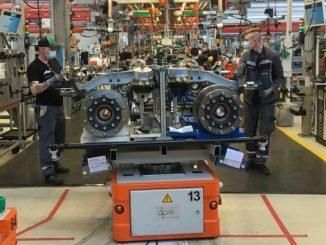
UK commercial vehicle (CV) manufacturing decreased by 1.9% in November, with 8,605 units rolling off production lines, according to figures published this week by the Society of Motor Manufacturers and Traders (SMMT).
While output for the domestic market rose 10.1%, with logistics and CV operators working flat out to meet growing demand for online deliveries, it failed to offset an 8.8% decline in exports, equivalent to a loss of 490 units, as stricter coronavirus restrictions closed off entire parts of key economies.
After production all but ground to a halt earlier in the year, output for the first 11 months is now down 16.1% to 59,539 units, with UK factories producing 11,419 fewer buses, coaches, vans, trucks and taxis than in the same month last year.
Year-to-date, this comes in at around an £825m cost to the UK commercial vehicle sector.
The SMMT said 94.1% of all commercial vehicle exports have been destined for EU markets so far this year, reinforcing the urgent need for negotiators to deliver a Brexit agreement that ensures free and fair trade for manufacturers and helps restore business confidence.
Speaking before news that a zero-tariff deal had now been agreed, Mike Hawes, SMMT chief executive, said: “While growing consumer demand for online deliveries has driven a need for new vehicles in the UK, e-commerce alone is not enough to make up the industry’s exports shortfall, even in the run-up to the year’s busiest retail period.
"A resurgence in coronavirus cases and the increasing fear of a ‘no deal’ Brexit as negotiating time runs out are already taking their toll, and we now, urgently, need an agreement with the EU that guarantees ongoing zero-tariff trade in order to allow the sector to recover and get back to long term growth.”
• British engine production for domestic and overseas markets fell by 7.8% and 8.4% respectively in November.
Engine output has declined in every month of 2020, with year-to-date output down 28.2%.
Added Hawes: “The eleventh consecutive month of decline for UK engine production is extremely concerning, and while the coronavirus pandemic has been the overriding cause, a lack of clarity on trade with the EU and other markets has also played a role."













